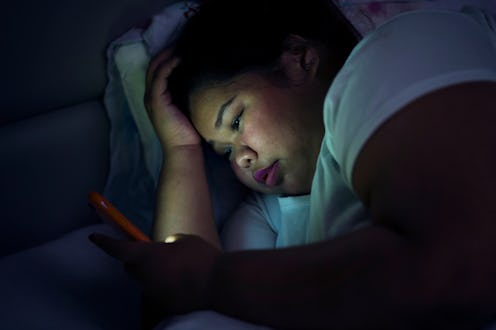Life
7 Ways To Tell If Your Sleep Troubles May Be Sleep Anxiety & Not A Hormonal Problem

There are so many sleep-promoting habits that seem good. For example, a warm mug of chamomile tea sounds like a delicious way to calm your body down, and soothing ocean sounds are the perfect way to try to trick yourself into believing you're relaxing on the beach. But sometimes simple sleep hacks don't lull you into a deep slumber, and something more serious is keeping you from getting the rest you need. It can be hard to tell whether anxiety is keeping you from sleeping well, or if you have a physical hormonal problem that's disrupting things, but according to sleep experts, there are some major signs that can help you differentiate between the two.
"Anxiety activates the amygdala, the part of the brain that regulates the fight or flight response as well as [...] emotions such as fear and anger," Rose MacDowell, chief research officer at Sleepopolis, tells Bustle. "Activation of the amygdala can delay or prevent sleep, while sleep deprivation can stimulate the amygdala even further, leading to a vicious circle of more anxiety and emotional reactivity." If you're experiencing anxiety at bedtime again and again over a period of time, it can lead to the kind of negative psychological conditioning behind almost all cases of chronic insomnia, she says.
Here are some signs that your sleep problems are anxiety-related and not hormone-related, so that you can know whether your body or your mind needs some extra help.
1It’s Episodic
"With anxiety, rough days are usually balanced with calm days, so your sleep troubles are occasional," Julie Lambert, a certified sleep expert at Happysleepyhead, tells Bustle. If you start keeping track of both your sleepless nights and your rougher mental health days, you can see whether they seem to line up. If they do, it's a pretty good hint that anxiety is to blame.
2You’re Absorbed By Your Thoughts
If you're feeling pretty healthy mentally even though you're dealing with sleep issues, that's one way to tell that your problems aren't due to anxiety. Do you lay awake in bed, unable to think of something peaceful? "When you feel anxious, your thoughts can rush, go in circles, or make you dive deep into your most terrible memories," Lambert says, "and it seems like you can’t stop that."
3You Just Don’t Feel Sleepy
While hormonal problems might make you toss and turn, desperate to get some much-wanted rest, with anxiety, you might not even feel like sleeping. "Anxiety triggers the production of adrenaline, cortisol, and other substances and neurotransmitters that keep you alert," she says. So if you've been able to power through a new book long into the night, or find yourself energized enough to do a load of laundry at 3 a.m., anxiety could be to blame.
4Your Heart Is Racing
"If you experience an abnormally increased heart rate that affects your ability to fall asleep, it’s a sign that you’re suffering from anxiety rather than a hormonal issue," Adina Mahalli, MSW, a certified mental health expert, tells Bustle. "Heart palpitations and a racing heart can put both your mind and body on edge, which prevents you from unwinding and falling asleep," she says. In addition to seeking professional help, try creating a relaxing night routine for yourself to cue your mind that it's time to calm down for bed.
5Your Thoughts Are More Disturbing Than Usual
While racing thoughts can be a sign of anxiety, the actual content about what's running through your mind can also speak to whether your sleep disturbances are due to your mental health. "Intrusive thoughts that keep your mind going in circles before your fall asleep are a sign of anxiety as opposed to hormonal problems," says Mahalli. "Disturbing thoughts that you can’t control can increase anxiety and prevent a restful night’s sleep." Try writing down any especially troubling thoughts you're having, because seeing them on paper might make them seem a little less scary.
6You Aren't Experiencing Other Physical Symptoms
If you're experiencing sleep issues due to hormones and not due to anxiety, you're likely to experience a number of other symptoms of the hormonal imbalance that won't appear if you're just dealing with anxiety, MacDowell says. Look out for signs such as hot flashes, menstrual changes, vaginal dryness, night sweats, and daytime fatigue, which could all accompany a hormone issue.
7Things Don't Get Better After Your Period
You might not realize it, but normal hormone fluctuations around your period can have a major effect on your sleep, so if your sleep issues don't revolve mostly around the days that you're menstruating, that could be a clue that it could be due to anxiety instead. "Sleep is often most disturbed in the days prior to and the first few days of the menstrual cycle," Terry Cralle, MS, RN, a clinical sleep educator and Saatva sleep consultant, tells Bustle.
Getting good sleep is such an important part of keeping your body and mind functioning at their strongest, so don't hesitate to seek professional help. Once you can slumber peacefully, you'll feel much better.
Editor's Note: If you or someone you know is seeking help for mental health concerns, visit the National Alliance on Mental Health (NAMI) website, or call 1-800-950-NAMI(6264). For confidential treatment referrals, visit the Substance Abuse and Mental Health Services Administration (SAMHSA) website, or call the National Helpline at 1-800-662-HELP(4357). In an emergency, contact the National Suicide Prevention Lifeline at 1-800-273-TALK(8255) or call 911.
This article was originally published on